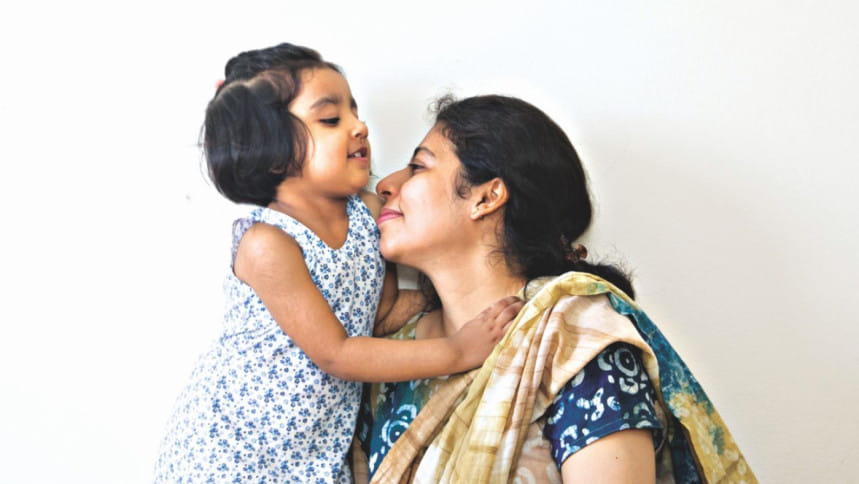Parenting Issues

While looking into this matter of mother-child relationship we have come across some interesting specialist's viewpoints regarding the issue. The society that we live in is changing beyond comprehension and we are visibly struggling to match out age old traditions with modern living. But perhaps the basics to a 'near perfect' mother-child relationship is not as different as it was even a few years ago.
We requested some of the leading experts in this field for their valuable comment and this is what they had to say.
THE BATTLE FOR INDEPENDENCE IRRESPECTIVE OF GENDER
There are specific life skills listed by the WHO that make up the core of a person's being. These include — decision making, problem solving, creative thinking/lateral thinking, critical thinking/perspicacity, effective communication, interpersonal relationships, self-awareness/mindfulness, assertiveness, empathy, equanimity, coping with stress, trauma and loss, and resilience.
All these skills work as the foundation for a child to grow in to a proper functional adult. Parents have the practice of taking over of everything which a child must learn on his or her own. Just as you have to fall a few times, even get hurt a little bit while learning to walk, the specific life skills also follow that type of learning curve. Parents simply protect or do not let the child face these essential parts of learning.
In these times, children are forced into a highly competitive academic environment from the very early years. The full focus falls on quantitative academic results. Parents are mostly aware of the physical well-being only up to the point that helps to reach the high academic results. In an achievement oriented education system, this has become the standard practice.
Mental well-being is almost struck off the priority list. Majority of parents become the only deciders of a child's academic path without any eye for capacity or interest.
While choice is a wide term, parents do not leave much for a child's choice. Starting from food to dressing up, everything is decided for the child. Even when a child learns to say no, their voice is hardly ever taken into consideration. Of course, excessive “no”-s are bad as well. Ultimately what is hampered is a child's assertiveness. At the same time killing off a child's curiosity or not taking time to hear a child's questions also dampens the ability to learn new things.
However, the lesson to be imparted to the child is that he or she has to be responsible with their response. Even if the child says “yes” in a moment of confusion or indecision, then there is a lesson to be learnt from it. This is part of the learning experience that parents need to nurture.
Independence, confidence and fearlessness are all achieved through the very best of parenting. But even then, a child turned adult faces newer challenges every day. Parenting is harder than ever in the current shifting society as well as the world. As a concerned parent, a mother needs to be aware that things are not the same as she faced (or just the same in some cases). The mentioned life skills are the ones that she too needs to instil in herself while taking care of her children.
- Dr Mehtab Khanam, PhD
Professor and Chairperson,
Department of Educational and Counseling Psychology,
University of Dhaka
THE IDEAL MOTHER-CHILD RELATIONSHIP
The ideal mother-child relationship, if narrowed down, should be based on “Do what I do, not what I say.” Children hate listening to too much advice. The relationship itself depends on how much (or how little) the mother is respected in the family or outside.
Also, just separating the relationship between a mother and child is not an effective way to see the relationship. The family itself is a system that impacts the mother-child relationship. Parents' interaction itself directly affects this particular relationship.
Regarding family, it's not just the parents and the siblings, it reaches the extended family as well. It goes without saying that how the mother is projected by the extended family members and in-laws affects the child directly. If he or she sees the mother being reprimanded by the father, being back-talked as a bad person or being humiliated by the in-laws, surely the child too will follow in these footsteps. In this case, the relationship itself is subjected to forces outside the mother and the child.
Mothers themselves are not free from the treatment they had received in their childhood as well as how they had seen their own mother. The combined impact of these end up in a downward spiral for the mother's own child if the experience was bad. Especially if the mother herself has her own subconscious fears and labels, it will cause a strain in her relationship with her children.
While bringing up a child and motherhood are two of the most difficult tasks, addressing some aspects can make for a better relationship. Body language is one of those things that a child picks up before verbal cues. Simple non-verbal communication as well as undertaken actions convey more impact on a child's mind, especially during the formative age.
From the mother's perspective to avoid future fall-out with her children, she has to work consciously. It is very difficult for any person to rise above his or her own bad upbringing, it's much more so for the mother. However, it is possible to address vital points. For a mother, one the best ways of maintaining a good relationship with her child is to be open as possible and “be friendly, not friends” with her children. Listening to the child, giving the child quality time are also activities a mother must pursue if she consciously wants to maintain a healthy, open and trusting relationship throughout.
- Dr Mehtab Khanam, PhD
Professor and Chairperson,
Department of Educational and Counseling Psychology,
University of Dhaka
PEER PRESSURE AND BULLYING
Bullying is a serious challenge faced by many children of all socio-economic groups, which leads to negative consequences for children. Children who are a bit 'different' than others are at higher risk of bullying. For example, if a child is overweight or underweight, have speech problem or any birth defect, s/he may be harassed by his/her classmates. Children are bullied for other reasons also (e.g. a new student in the class may be bullied).
Should parents interfere when children are being bullied? There is no straight forward answer to that. This will depend on the situation. It is important for children to be self-confident about who they are. Parents should celebrate their uniqueness and guide them to speak up for themselves when faced with bullying. If children are able to address the situation by themselves then parents do not need to interfere. But if bullying happens repeatedly involving physical as well as mental abuse, and cause serious harm to children then parents must raise the issue with the school authority, and ensure that appropriate measures are being taken to end this.
Sometimes children do not inform parents that they are being bullied in schools or other settings. So it is critical to create an environment where parent-child communication is strong and children can express themselves freely to the parents without any fear. This will be helpful for parents in identifying if interference is required.
Photo: Sazzad Ibne Sayed
Model: Bidhu and Tavishee

 For all latest news, follow The Daily Star's Google News channel.
For all latest news, follow The Daily Star's Google News channel. 



Comments